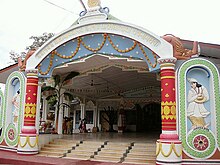Namghar (Assamese: নামঘৰ lit. 'prayer house') is a place for congregational worship associated with the entire Assamese community and the Ekasarana sect of Hinduism, in particular, that is native to Assam.[1][2] Besides forming the primary structure used for worship, they also function as meeting houses for congregations, as well as theaters for dramatic performances (bhaona). The Namghar, also called the kirtanghar, is also the central structure in the Sattras (monasteries of the Ekasarana dharma) where the other buildings are positioned around it. Namghars are widespread in Assam, and very often more than one namghar exists in a single village, signifying many congregational communities.[1]


Namghars were introduced in Assam by the Vaishnavite saints Damodardev, Madhavdev and Sankaradeva for Assamese people where they can culture and practice naam (devotional songs) and Bhakti of God (devotion).[3][4] He established the first Naamghar at Bordowa in Nagaon district. There is a Namghar in Puri as well, near the Jagannath Temple.[2][1]
Functions
editSocial activities
editNamghars are used for educational, political, cultural and developmental activities and discussions undertaken in a democratic manner.
References
edit- ^ a b c "The Nāmghar or Name-House". atributetosankaradeva. 2 October 2008. Archived from the original on 16 August 2013. Retrieved 4 April 2013.
- ^ a b "Namghar – The prayer house of Assam". Joiaaiaxom.com. Archived from the original on 30 June 2017. Retrieved 4 April 2013.
- ^ "The Namghar | Assam Portal". Assam.org. 10 April 1998. Archived from the original on 15 October 2011. Retrieved 4 April 2013.
- ^ "Online Assam: Assamese Namghar, Srimanta Shankardev Namghar At Puri Sri Jagannath Dham". Onlineassam.blogspot.in. 25 November 2010. Archived from the original on 9 October 2013. Retrieved 4 April 2013.
Bibliography
edit- Cantlie, Audrey (1984), The Assamese, London
{{citation}}: CS1 maint: location missing publisher (link) - Neog, Maheshwar (1980). Early History of the Vaishnava Faith and Movement in Assam. Delhi: Motilal Banarasidass.